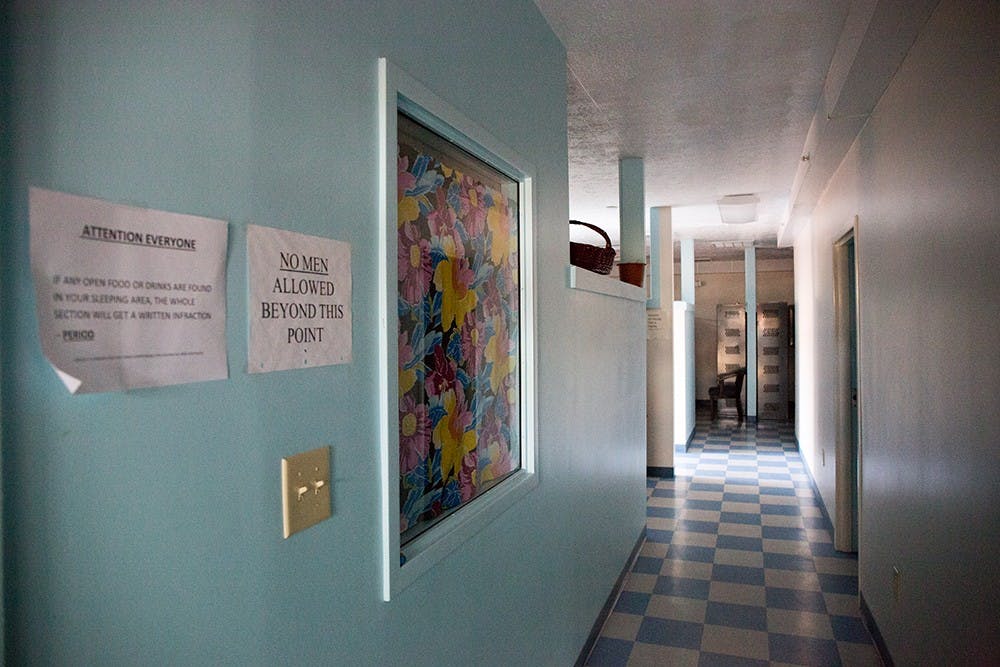Two white flags hang from the porch at Boxcar Books.
One insists that readers call the township board and have funding removed from Martha’s House, a local homeless shelter.
Martha’s House, the flag says, has transphobic policies, segregating people at the shelter according to biological sex.
These policies led to a Human Rights Commission case against the cash-strapped shelter last year. Nothing has changed.
***
About a year ago, Interfaith Winter Shelter director Samantha Harrell met Sara Cole, who describes herself on Facebook as a pre-operation male-to-female transsexual. They met when Cole came to Interfaith after living briefly at Martha’s House.
“A woman came late, crying, terrified,” Harrell said. “She tells me Martha’s House had her stay with men.”
Martha’s House is divided into two sides: men’s and women’s.
If Perry Township Board member Dan Combs had been with Cole that night, he would have found an alternative option.
“I cannot recall one time we sent a transgendered person to a shelter, because of safety,” Combs said. “I’ve put people in motels before to avoid it.”
Harrell said Cole told her she asked to be placed with the women.
“She was interrogated about her genitals, her surgery status,” Harrell said. Because she was pre-operational, Martha’s House policy dictated she live on the men’s side of the shelter. Then, Harrell said, came problems.
“She was getting so many death threats,” Harrell said. “They would include ‘Martha’s House says you’re a man.’ And the threats followed her.”
The Indiana Daily Student reached out to Cole, who was unavailable for contact. But her story lives in a file in City Hall where, with the help of Harrell, she filed a human rights violation.
“The male residents taunted and harassed me,” Cole said in her statement. “Early shift staff tried to stop the harassment, but the late shift staff did nothing.”
She wanted an apology, a change in Martha’s House policies and special training for both staff and residents.
Harrell said she started to take the situation into her own hands, sending a complaint to Martha’s House and helping Cole file a complaint to the Human Rights Commission.
Martha’s House submitted its version of events to the commission, complaining about her behavior at the shelter.
“... other Martha’s House residents complained about Ms. Cole, alleging that she repeatedly stared at other men’s genitals in the restroom, monopolized the restroom and told a female resident that she wanted to be alone with that resident’s husband because he was ‘so sexy,’” commission investigator Byron Bangert and director Barbara McKinney wrote in their report.
Martha’s House, according to the report, banned Cole from the shelter for these actions, not because she was transgender.
The report noted that Cole denied any “disputes caused at the facility.” It went so far as to posit that some of the complaints brought against her might have been made by residents “out of their own prejudice or phobia.”
“Bloomington is unable to enforce its prohibition against gender identity discrimination with the same legal teeth available in cases alleging sex or race discrimination,” the report said.
The Human Rights Commission had strict legal parameters to work in, ones not made for cases like Cole’s.
The commission sided with Martha’s House, saying that it was within its legal rights to house Cole on the men’s side since the shelter said it attempts to create a safe environment for all residents.
***
The Perry Township Board determines which local nonprofits receive government funding.
Combs said he didn’t agree with the way Martha’s House had set up their policy, but there was nothing the township could really do.
Martha’s House is contracted by the township to operate a homeless shelter. The township pays them $1 every year to keep Martha’s House going. Combs said at least three other counties also contribute to its funding.
Although Martha’s House has a contract with the township, the shelter is responsible for its interior polices, and those are not easily altered.
Combs said the township was looking at turning the financially struggling shelter into a detox center sometime in the summer.
“If it becomes a detox center, then there would be a contract change,” Combs said.
The new management coming in could modify the policies of the shelter. Harrell said she wasn’t optimistic about that.
“The new group will write a policy, and I’ve gotten no guarantee it won’t be transphobic,” Harrell said.
Combs said the potential detox center would change Martha’s House to a facility where every person sleeps in the same room under 24-hour supervision.
“It could be safer,” Combs said.
But both he and Harrell agreed it still wouldn’t be the safest place for transgender people.
***
Harrell contacted Jean Kapler, an activist for transgender issues who edited a guideline for Martha’s House to use.
Kapler offered free training on transgender issues for Martha’s House employees. No one came forward.
Kapler wrote about various ways the shelter could be made transgender-inclusive. Nothing came of the document, because Martha’s House was incapable of housing pre-operational transgender people because of a lack of space and finances, said Robert Miller, board president at Martha’s House.
“We cannot provide a third area for transgender people,” Miller said. “We are limited.”
Miller said Martha’s House’s policies are for the best interests of all residents.
“We have to ensure our residents are secure,” Miller said. “That’s why the rule is based on physiology.”
Combs said there was no guarantee the board would make sure that newer, more inclusive policies were built into Martha’s House when the time comes to change them.
“The policies have been in place for the past 12 years,” Combs said. “We do have a pretty progressive board.”
Harrell said when she last knew, Cole was still in a state of transition. Her Facebook profile says that as of September 2014, she is no longer homeless.
The Human Rights Commission might not have been able to directly address the issue of where Martha’s House — and potentially other shelters — should place pre-operational transgender people. But they acknowledged the problem.
“Currently, there does not seem to be long-term housing in Bloomington that meets the specific needs of transgender people,” the report states. “We also urge Martha’s House ... to consider without prejudice whether housing based on physiology rather than gender identity is in fact more likely to insure safe and orderly accommodations for all residents.”
Harrell and Combs said they cannot think of a truly safe place for transgender people. Nor can the Human Rights Commission, according to its ruling: “They are truly homeless.”






